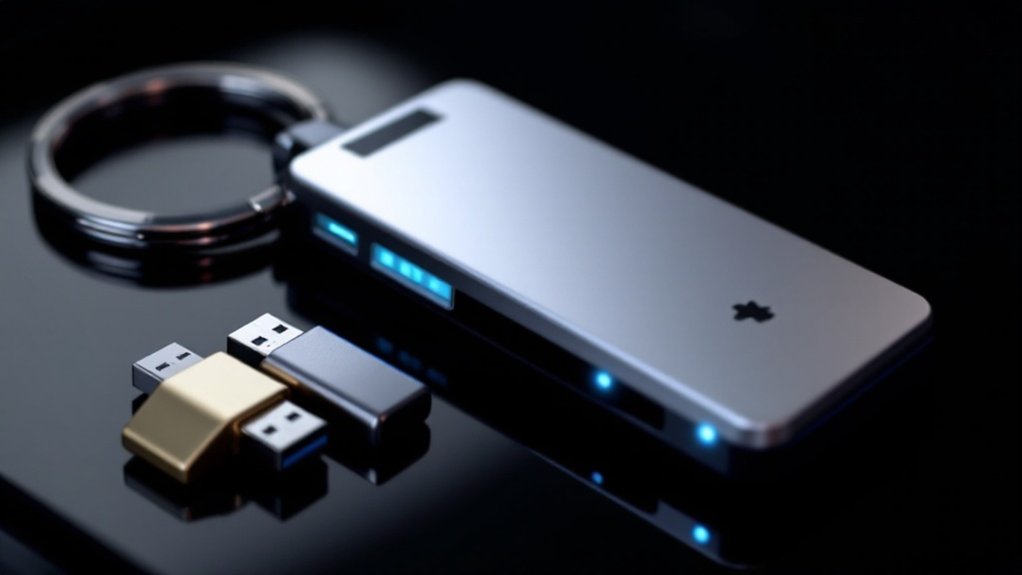A crypto wallet isn't actually a wallet at all – it's a digital tool that stores private keys for accessing cryptocurrency on the blockchain. Think of it like a high-tech safety deposit box without the actual box. The wallet generates public keys for receiving crypto and keeps private keys secure for spending it. Hot wallets connect to the internet, while cold storage stays offline. Security features protect against digital thieves prowling for poorly-protected crypto. There's more to this tech than meets the eye.

A crypto wallet serves as the digital vault of the cryptocurrency world – though calling it a "wallet" is somewhat misleading. In reality, these tools don't actually store your crypto at all. Instead, they safeguard the private keys that give you access to your digital assets on the blockchain. Think of it like having the keys to a safety deposit box, except this box exists in cyberspace.
These wallets come in various flavors, each with its own quirks and features. Hot wallets stay connected to the internet, making them convenient but somewhat risky – like keeping your money in your back pocket. Cold wallets, on the other hand, stay offline and are basically the digital equivalent of stuffing cash under your mattress. Hardware wallets are physical devices that look like USB drives, while software wallets are apps you can download to your phone or computer. Self-ownership of funds is a major advantage of using crypto wallets, giving users complete control over their assets.
Every crypto wallet operates with two crucial components: a public key and a private key. The public key generates your wallet address – it's like your email address for receiving crypto. The private key? That's your secret password, and you'd better guard it with your life. Lose it, and you can kiss your crypto goodbye. Secure enclaves protect these critical keys from extraction by malicious software.
The crypto world is a dangerous place, full of digital predators looking to steal your assets. Phishing scams, malware, and man-in-the-middle attacks are just a few of the threats lurking in the shadows. That's why modern wallets come packed with security features like multi-factor authentication, biometric scanning, and encryption. Non-custodial solutions offer users complete ownership of their private keys, eliminating dependence on third-party services.
Security isn't optional in crypto – it's survival. Every feature and safeguard stands between your assets and digital predators hunting for prey.
Choosing a wallet isn't like picking out socks – it requires careful consideration. You'll need to think about which cryptocurrencies you want to store, whether the wallet plays nice with your preferred blockchain networks, and how user-friendly the interface is.
Some wallets integrate with exchanges, while others pride themselves on their independence. The crypto market doesn't forgive mistakes, so users need to take security seriously by using strong passwords, enabling two-factor authentication, and keeping their wallet software updated.
Frequently Asked Questions
Can I Recover My Crypto if I Lose My Wallet's Private Key?
Without the private key, crypto recovery is usually impossible. That's just how blockchain works – brutal but true.
However, if the wallet's seed phrase was properly saved during setup, there's hope. Those 12-24 random words can regenerate everything, including private keys.
No seed phrase either? Game over. Those coins are likely locked away forever, joining billions in permanently lost crypto.
A harsh lesson in digital security.
How Much Does It Cost to Set up a Crypto Wallet?
Setting up a crypto wallet can cost nothing or quite a bit – depends on what you want.
Basic software and mobile wallets? Free.
Hardware wallets from reputable brands run $50-200.
Paper wallets cost pennies (just paper and ink).
The fancy premium versions of software wallets might set you back $10-50.
But hey, with crypto security, you often get what you pay for.
Some high-end wallets pack serious features worth the investment.
Are Hardware Wallets Safer Than Software Wallets for Storing Cryptocurrency?
Hardware wallets are considerably safer than software wallets. Period.
They store private keys offline in a secure element, completely isolated from the internet. That means no hackers, no malware, no phishing scams.
Software wallets? Always connected, always vulnerable. Sure, hardware wallets cost more and aren't as convenient, but they're basically Fort Knox for crypto.
Physical theft is still possible – but good luck extracting those keys from the secure chip.
What Happens to My Crypto if the Wallet Provider Goes Bankrupt?
The impact of a wallet provider's bankruptcy depends entirely on the wallet type.
With custodial wallets, it's dicey – your crypto could be tied up in bankruptcy proceedings as you're fundamentally an unsecured creditor. Yikes.
But with non-custodial wallets? No sweat. Your assets live on the blockchain, not with the provider.
As long as you've got your private keys or recovery phrase, your crypto stays yours. The provider could vanish tomorrow – wouldn't matter.
Can I Store Different Types of Cryptocurrencies in One Wallet?
Yes, multi-chain wallets let users store different cryptocurrencies in one place.
Trust Wallet, Exodus, and Klever are popular options that handle multiple coins.
But here's the catch – not every wallet supports every cryptocurrency. Users need to check compatibility first.
These wallets are pretty handy, offering one interface to manage various crypto assets.
Think of it like a digital Swiss Army knife for crypto – convenient, but choose carefully.





